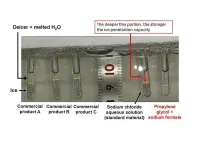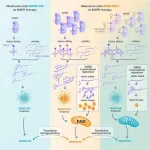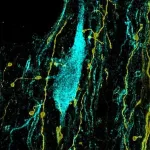(Press-News.org) Immunotherapy is one of the pillars in the fight against cancer and aims to enable the body's own immune system to fight a tumor. A recent study now shows that removing certain enzymes that regulate epigenetic processes from the so-called dentritic cells of the immune system influences their development and thus improves anti-tumor immunity. This finding could lead to new therapeutic strategies in immunotherapy. The study by Cristiano De Sá Fernandes from Maria Sibilia's research group at the Center for Cancer Research and the Comprehensive Cancer Center of MedUni Vienna and Vienna General Hospital was recently published in Cell Reports.
Cancer cells are the body's own cells that do not divide and develop as intended and abandon their place and function in the body. The difficult thing about fighting them is that, as the body's own cells, the immune system cannot recognize them well and therefore cannot fight them. This is where immunotherapy kicks-in: It enables the patient's own immune system to identify the cancer cells and activate the body's own defenses.
Dendritic cells (DCs) are important cells of the immune system that develop from precursor cells and can form different subgroups by changing their gene activity. These subgroups fulfill different functions in the immune system. However, it is not yet known exactly how certain epigenetic changes in chromatin (the material that makes up chromosomes) influence the development of DCs. In the study, the researchers inhibited two enzymes that regulate such epigenetic processes to see how this affects the development and function of DCs. They focused on the specific enzymes HDAC1 and HDAC2.
Improved immune response
Through multi-omics analyses, i.e. the analysis of several biological data such as gene expression and chromatin accessibility, the researchers found that the development of certain subgroups of DCs was impaired by the absence of HDAC1. This shows that HDAC1 plays a crucial role in their development. In the absence of HDAC1, DCs change their immune response, which improves tumor surveillance. Removing the enzyme HDAC2, on the other hand, had no major effect on the development of DCs.
In summary, the study shows that the removal of HDAC1 influences the development of certain DC subsets and improves anti-tumor immunity. These findings could lead to new therapeutic strategies in cancer immunotherapy.
This study was conducted as part of the FWF-funded PhD program DocFunds "Tissue Home", first author Cristiano de Fernandes was a PhD student.
END
Basic research: Inhibition of epigenetic control enzymes in immune cells as a potential new starting point in cancer immunotherapy
Finding could lead to new therapeutic strategies in immunotherapy
2024-06-07
ELSE PRESS RELEASES FROM THIS DATE:
Tracking greenhouse gas emissions in Chinese value chains with an interprovincial input–output model
2024-06-07
China’s economy has shifted from a stage of high growth to a stage of high-quality development, and the establishment of a dual-carbon target requires profound changes in the industrial structure and energy systems, as well as finding the right direction and pathway for industrial adjustment. While the potential for technological emission reduction continues to be released, the main factor affecting China’s carbon emissions is the speed and intensity of economic transformation and industrial restructuring.
A research team of Dr. GU Alun from Tsinghua University in Beijing, China, recently analyzed the correlations ...
Earth and space share the same turbulence
2024-06-07
Fukuoka, Japan—In a paper published in Geophysical Research Letters, researchers have discovered that the turbulence in the thermosphere exhibits the same physical laws as the wind in the lower atmosphere. Furthermore, wind in the thermosphere predominantly rotates in a cyclonic direction, in that it rotates counterclockwise in the Northern Hemisphere and clockwise in the Southern Hemisphere.
The findings reveal a new unified principle for the Earth’s varied environmental systems and can potentially improve future forecasting of both earth and space weather.
One time or another we’ve tuned in to see the latest weather forecast, and while ...
With programmable pixels, novel sensor improves imaging of neural activity
2024-06-07
Neurons communicate electrically so to understand how they produce brain functions such as memory, neuroscientists must track how their voltage changes—sometimes subtly—on the timescale of milliseconds. In a new paper in Nature Communications, MIT researchers describe a novel image sensor with the capability to substantially increase that ability.
The invention led by Jie Zhang, a postdoctoral scholar in The Picower Institute for Learning and Memory lab of Sherman Fairchild Professor Matt ...
Frozen? Let it melt with efficient new deicer friendly to the environment
2024-06-07
The dangers of frozen roads, airplane engines, and runways are well known, but the use of commercial products often means short-term safety over long-term environmental degradation. Seeking a better product, Osaka Metropolitan University researchers have developed a deicing mixture offering higher performance than deicers on the market while also having less impact on the environment.
The team, made up of graduate student Kai Ito, Assistant Professor Arisa Fukatsu, Associate Professor Kenji Okada, and Professor Masahide Takahashi of the Graduate School of Engineering, used machine learning to analyze ice melting mechanisms of aqueous solutions of 21 salts and 16 organic ...
Aging speeds up and lifetime becomes shorter in animals whose cells ‘believe’ to have too many nutrients, despite following a normal diet
2024-06-07
Cells are signalled to have nutrients in excess, and this leads to malfunction and inflammation in organs such as the pancreas, the liver and the kidneys.
The finding, by CNIO researchers, are published in Nature Aging. It suggests that an intervention on the inflammation alone can relieve symptoms and increase survival.
The research has been conducted on animal models, but comparing their molecular processes with blood samples from people in their seventies indicates that they can be extrapolated to human aging.
The reality of a population who is ageing at an accelerated rate makes it a priority to understand what happens in the body over time, ...
Transfer RNAs at the heart of therapeutic resistance
2024-06-07
An international research team led by scientists from the University of Liège has discovered an interesting new therapeutic target for the treatment of melanoma resistant to targeted therapies. Inhibition of the VARS enzyme could prevent this therapeutic resistance by resensitising tumours resistant to these targeted therapies.
Melanoma is one of the most serious and aggressive forms of skin cancer. When diagnosed early, melanoma is surgically removed. However, once metastases (i.e. secondary distant tumours) have developed, ...
Brain circuits underlying learning from negative experiences
2024-06-07
‘I’m not gonna do this again’, we often say when faced with negative feedback, adverse effects, or disappointing outcomes. Thus, we attempt to learn from such negative experiences. This principle is also a cornerstone of our education system: failing an exam ought to encourage students to do better next time.
How does the brain achieve this type of learning? Positive and negative reinforcement appear as two sides of the same coin in parts of the brain’s valuation system. Notably, some neurons that release the neuromodulator ‘dopamine’ represent outcomes better vs. worse ...
What’s going on in our brains when we plan?
2024-06-07
In pausing to think before making an important decision, we may imagine the potential outcomes of different choices we could make. While this “mental simulation” is central to how we plan and make decisions in everyday life, how the brain works to accomplish this is not well understood.
An international team of scientists has now uncovered neural mechanisms used in planning. Its results, published in the journal Nature Neuroscience, suggest that an interplay between the brain’s prefrontal cortex and hippocampus allows us to imagine future outcomes in order to guide our decisions.
“The prefrontal cortex acts as a ‘simulator,’ ...
Robotic device restores wavelike muscular function involved in processes like digestion, aiding patients with compromised organs
2024-06-07
A team of Vanderbilt researchers has developed a wirelessly activated device that mimics the wavelike muscular function in the esophagus and small intestine responsible for transporting food and viscous fluids for digestion.
The soft-robotic prototype, which is driven by strong magnets controlled by a wearable external actuator, can aid patients suffering from blockages caused by tumors or those requiring stents. For example, traditional esophageal stents are metal tubes used in patients with esophageal cancer, mostly in an aging population. These patients risk food being blocked from entering the stomach, potentially ...
DOE announces new decadal fusion energy strategy
2024-06-07
WASHINGTON, D.C.—The U.S. Department of Energy (DOE) today marked the two-year anniversary of the Biden-Harris Administration's launch of the U.S. Bold Decadal Vision for Commercial Fusion Energy with the release of the DOE Fusion Energy Strategy 2024 and an event at the White House co-hosted by the White House Office of Science and Technology Policy.
At the inaugural event where the Bold Decadal Vision was unveiled, DOE launched a Department-wide initiative to develop a strategy for accelerating the viability of commercial fusion energy in partnership with the private sector. The newly released DOE Fusion Energy ...
LAST 30 PRESS RELEASES:
A promising potential therapeutic strategy for Rett syndrome
How time changes impact public sentiment in the U.S.
Analysis of charred food in pot reveals that prehistoric Europeans had surprisingly complex cuisines
As a whole, LGB+ workers in the NHS do not experience pay gaps compared to their heterosexual colleagues
How cocaine rewires the brain to drive relapse
Mosquito monitoring through sound - implications for AI species recognition
UCLA researchers engineer CAR-T cells to target hard-to-treat solid tumors
New study reveals asynchronous land–ocean responses to ancient ocean anoxia
Ctenophore research points to earlier origins of brain-like structures
Tibet ASγ experiment sheds new light on cosmic rays acceleration and propagation in Milky Way
AI-based liquid biopsy may detect liver fibrosis, cirrhosis and chronic disease signals
Hope for Rett syndrome: New research may unlock treatment pathway for rare disorder with no cure
How some skills become second nature
SFU study sheds light on clotting risks for female astronauts
UC Irvine chemists shed light on how age-related cataracts may begin
Machine learning reveals Raman signatures of liquid-like ion conduction in solid electrolytes
Children’s Hospital of Philadelphia researchers emphasize benefits and risks of generative AI at different stages of childhood development
Why conversation is more like a dance than an exchange of words
With Evo 2, AI can model and design the genetic code for all domains of life
Discovery of why only some early tumors survive could help catch and treat cancer at very earliest stages
Study reveals how gut bacteria and diet can reprogram fat to burn more energy
Mayo Clinic researchers link Parkinson's-related protein to faster Alzheimer's progression in women
Trends in metabolic and bariatric surgery use during the GLP-1 receptor agonist era
Loneliness, anxiety symptoms, depressive symptoms, and suicidal ideation in the all of us dataset
A decision-support system to personalize antidepressant treatment in major depressive disorder
Thunderstorms don’t just appear out of thin air - scientists' key finding to improve forecasting
Automated CT scan analysis could fast-track clinical assessments
New UNC Charlotte study reveals how just three molecules can launch gene-silencing condensates, organizing the epigenome and controlling stem cell differentiation
Oldest known bony fish fossils uncover early vertebrate evolution
High‑performance all‑solid‑state magnesium-air rechargeable battery enabled by metal-free nanoporous graphene
[Press-News.org] Basic research: Inhibition of epigenetic control enzymes in immune cells as a potential new starting point in cancer immunotherapyFinding could lead to new therapeutic strategies in immunotherapy




